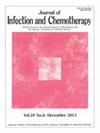Invasive pneumococcal disease caused by CO2-dependent Streptococcus pneumoniae serotype 24F sequence type 162: A case report
IF 1.9
4区 医学
Q3 INFECTIOUS DISEASES
引用次数: 0
Abstract
We report the case of a man in his 70s who developed invasive pneumococcal disease (IPD) caused by CO2-dependent Streptococcus pneumoniae. He was admitted with suspected pneumonia based on chest X-ray and computed tomography imaging findings. Ceftriaxone treatment was initiated following the collection of sputum samples and two sets of blood cultures. The antimicrobial treatment was then changed to sulbactam/ampicillin (SBT/ABPC) because urine pneumococcal antigen testing performed on admission was positive. The following day, CO2-dependent S. pneumoniae was isolated from the blood cultures and sputum sample, leading to a diagnosis of IPD. The patient continued SBT/ABPC treatment (6 g/day) but remained febrile and died 4 days after admission. Serotyping and whole-genome sequence analysis of the isolate revealed that it was serotype 24F and sequence type (ST) 162. A c.536C > T mutation was identified in murF of the isolate compared with S. pneumoniae Spain9V-3. The isolation of CO2-dependent S. pneumoniae serotype 24F ST162 from pediatric patients in Japan was recently reported. However, to the best of our knowledge, this is the first reported IPD case in an elderly patient caused by CO2-dependent S. pneumoniae serotype 24F ST162. Thus, even in adults with IPD, caution should be exercised going forward.
由co2依赖性肺炎链球菌血清型24F序列162型引起的侵袭性肺炎球菌病1例
我们报告的情况下,在他的70谁开发的侵袭性肺炎球菌疾病(IPD)由二氧化碳依赖性肺炎链球菌引起的男子。根据胸部x光片和计算机断层扫描成像结果,他被怀疑患有肺炎。在收集痰样本和两组血培养后开始头孢曲松治疗。由于入院时进行的尿肺炎球菌抗原检测呈阳性,抗菌治疗随后改为舒巴坦/氨苄西林(SBT/ABPC)。第二天,从血培养和痰样本中分离出二氧化碳依赖性肺炎链球菌,从而诊断为IPD。患者继续接受SBT/ABPC治疗(6 g/天),但仍处于发热状态,入院后4天死亡。血清分型和全基因组序列分析显示该分离株血清型为24F,序列型为ST 162。与西班牙肺炎链球菌9v -3相比,分离株的murF中存在c.536C>T突变。最近报道了从日本儿科患者中分离出co2依赖性肺炎链球菌血清型24F ST162。然而,据我们所知,这是首次报道的由co2依赖性肺炎链球菌血清型24F ST162引起的老年患者IPD病例。因此,即使在患有IPD的成人中,也应谨慎行事。
本文章由计算机程序翻译,如有差异,请以英文原文为准。
求助全文
约1分钟内获得全文
求助全文
来源期刊

Journal of Infection and Chemotherapy
INFECTIOUS DISEASES-PHARMACOLOGY & PHARMACY
CiteScore
4.10
自引率
4.50%
发文量
303
审稿时长
47 days
期刊介绍:
The Journal of Infection and Chemotherapy (JIC) — official journal of the Japanese Society of Chemotherapy and The Japanese Association for Infectious Diseases — welcomes original papers, laboratory or clinical, as well as case reports, notes, committee reports, surveillance and guidelines from all parts of the world on all aspects of chemotherapy, covering the pathogenesis, diagnosis, treatment, and control of infection, including treatment with anticancer drugs. Experimental studies on animal models and pharmacokinetics, and reports on epidemiology and clinical trials are particularly welcome.
 求助内容:
求助内容: 应助结果提醒方式:
应助结果提醒方式:


